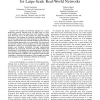Free Online Productivity Tools
i2Speak
i2Symbol
i2OCR
iTex2Img
iWeb2Print
iWeb2Shot
i2Type
iPdf2Split
iPdf2Merge
i2Bopomofo
i2Arabic
i2Style
i2Image
i2PDF
iLatex2Rtf
Sci2ools
INFOSCALE
2006
ACM
2006
ACM
A generic search strategy for large-scale real-world networks
— We consider the following situation for a given large-scale network: Starting from an initial node we move to its neighbor node and repeat that until reaching a target node. How fast can we do this without any global topological information? This problem is considered “searching networks”, and several approaches have been proposed. In this paper, we present a general framework of search strategies, under which all of these existing approaches can be formalized. Our framework characterizes random search strategies by the following three parameters: memory for previously-visited nodes, look-ahead property and transition probability. Through computational simulations for large-scale networks with small-worldness and scale-freeness, we investigate the relationship between the effect of parameters of the strategies and the coefficients of networks such as the clustering coefficient. The comparison result provides a guideline to obtain good parameters of the strategies according to...
| Added | 13 Jun 2010 |
| Updated | 13 Jun 2010 |
| Type | Conference |
| Year | 2006 |
| Where | INFOSCALE |
| Authors | Yuichi Kurumida, Tsukasa Ogata, Hirotaka Ono, Kunihiko Sadakane, Masafumi Yamashita |
Comments (0)

